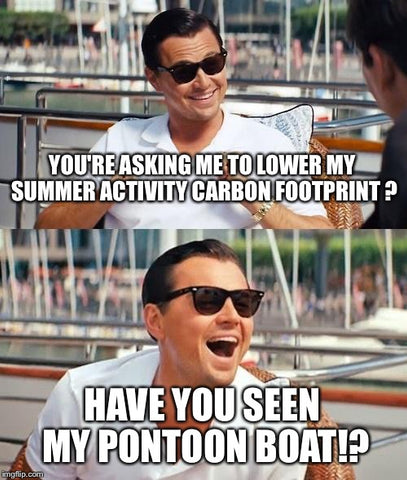
4 Common Mistakes Boaters Make | Pontoon-Depot
Mistake 1: Underestimating What It Takes to Operate a Boat
Both experienced and novice boaters can underestimate the level of knowledge, skill and experience required to operate a boat effectively and safely. From trailering and launching, to safe anchoring, to docking and undocking, the equipment, navigation, handling and rules of the road are completely different than on land. Serious accidents, including swamping and capsizing, often result from simple failures such as loading a boat properly and within capacity or anchoring safely. Studying the rules of the road, getting safe boating instruction, and ensuring you know and understand your boat are all key to avoiding accidents.
Mistake 2: Inattention
The beauty and fun of being on the water can make boating seem carefree and effortless. A brief lapse in attention is often behind groundings, collisions and capsizing. Many accidents occur late in the day, when operators are fatigued. Many involve collisions with markers, jetties and other obstacles that are visible and avoidable. The water may seem calm and familiar, but operator attention and diligence are vital.
Mistake 3: Boating Under the Influence
Fun, relaxation and friendship go hand in hand with boating. While no amount of alcohol is safe for a boat operator, the sun and fun that make boating so enjoyable can also make alcohol more dangerous for passengers. Dehydration, physical exertion and fatigue can accelerate and amplify the effects of alcohol, more quickly impairing judgment and coordination, which increases the chances of risky behavior and injury, and the danger of falling overboard. Intoxicated individuals on board pose an increased risk of injury to themselves and others.
Mistake 4: Failing to Recognize Risks
Bad weather, unfamiliar locales and hazardous waters are risks that boaters sometimes fail to account for. Responsible boaters learn to respect the weather and to check conditions prelaunch and while on the water to avoid sudden storms. While exploring new areas is part of the fun, it’s smart to check with local boating authorities if you’re heading out on an unfamiliar body of water. They can point out known hazards and offer navigation tips.
Mistake 5: Underpreparing for Emergencies
Filing a float plan and ensuring that proper emergency and communication equipment are present and working are essential safety precautions. But preparation only begins there. Passengers, as well as the operator, need to know basic emergency procedures, how to communicate and how to use emergency equipment if the operator becomes incapacitated. Practicing with equipment is particularly important, as every moment is precious in an emergency. It’s smart to have all aboard know and practice the basics of safe rescue techniques for a person in the water (PIW) (or “man overboard”). Finally, ensure that everyone aboard wears a life jacket at all times. If something goes wrong or there is a fall overboard, there is often no time and no way to access a life jacket.
The Coast Guard provides a wide range of safety information and resources through its Boating Safety Resource Center. For more information, visit uscgboating.org.
- Scott Reynolds
- Tags: Boating Safety pontoon boat Pontoon Boat Operating

What are the Materials Best for the Structural Floor | Pontoon-Depot
What are 3 basic types of materials used for the structural floor of a Pontoon Boat:
Composites: In recent years some manufactures have made more composite flooring options available. There's been a effort to meet customer demand for a decay proof deck material without all the structural drawbacks normally associated with aluminum decking. Composites are made largely made of recycled plastic products formed into panels similar in size and thickness of wood. Composites are far superior to aluminum in insulating qualities. Rigidity is generally superior to aluminum but still inferior to wood. Earlier versions did over time suffer from sagging. However the later composites panel decking has fiberglass reinforcement that has corrected these concerns. However this piece of mind does come with a price however, for composites often is a more expensive option if available.
Aluminum: Is available as a deck material from various pontoon boat manufactures. Aluminum is generally offered as an option to ease customer fears of woods potential to decay. And aluminum does offer peace of mind for the customer and has become a major marketing tool for those manufactures that offer it. However when considering some of the desirable characteristics described earlier, aluminum does indeed have some shortcomings to consider as a deck material. Aluminum has poor panel span strength and rigidity. To compensate this most manufactures lay aluminum in sections of pieces six to eight inches wide. While in comparison other materials are generally four foot wide sections. To cut costs many manufactures also use self tapping screws to fasten it in place. All the additional seams also result in an increase of stress and wear on the carpet over time. Aluminum also has poor insulating qualities of both sound and heat. But there are many people who feel that the prospects of no decay over ride all the negative aspects of this material.
Wood is the most traditional of all the decking materials. In almost all the above desirable characteristics it has the most desirable qualities. Wood also has the greatest rigidity and panel strength of all the available materials. Its insulating qualities are as good as the composites. It's also one of the least stressful and maybe best substrates when used with carpet. However wood can, have and does exhibit decay. Like any organic material if it's left untreated it will have poor survivability in a wet marine environment. Therefore you should be certain that a good grade of marine plywood was used in the construction of your boat. If marine grade CCA treated 3/4 in. plywood was used in construction and some general care was taken of the boat, you can rest assured that you'll get many years of relatively carefree service from your pontoon boat purchase before any issues or observation of any decay.
Excerpt taken from a longer article on - http://www.pontoonhouseboatodyssey.com
- Scott Reynolds
- Tags: Marideck Flooring pontoon boat pontoon boat Refurbishing Used Pontoon Boats

10 Question to Ask When Calling About a Used Boat | Pontoon-Depot
Are you calling a boat owner to inquire about a boat you seen posted for sale? Here's a handy checklist of perspective questions.
-
What year is the motor, and is there a trailer? You'll need to check this out later but never assume they are the same.
-
How long have you had or owned the boat? A warning, people who are selling after just a brief ownership may be trying to dump a problem.
-
Are you the original owner? The value here is if you are dealing with the first owner you can inquire about its entire mechanical history.
-
Is the boat equipped with an hour meter? If the answer is no then forget about all assurances of low hours, for without a meter there's no way to verify hours.
-
Why are you selling the boat? If the owner is wanting to buy, or buying a larger boat why isn't he trading it in? Often it's because they have an inflated opinion of the true value of the boat and are unwilling to deal for its real true value.
-
Will there be a water source accessible if I come to look at your boat? You'll need at least a hose to properly evaluate the motor.
-
Will there be an opportunity to test the boat? If you can't drive it, you don't really want to buy it.
-
Would you make sure the batteries are charged when I arrive to look at the boat? Never assume batteries in boat are charged.
-
Has there ever been any major engine work and when? You'll want to know the history of the motor. If the answer is yes ask when, by whom, and ask about seeing the receipts.
-
Has the boat ever been wrecked or had any major structural work?Just like autos a rebuilt or re-constructed wreck has a lower resale value than one without a history.
This excerpt was taken from a longer blog post at - http://www.pontoonhouseboatodyssey.com/
- Scott Reynolds
- Tags: pontoon boat Pontoon Boat Buying Guide Used Pontoon Boats




